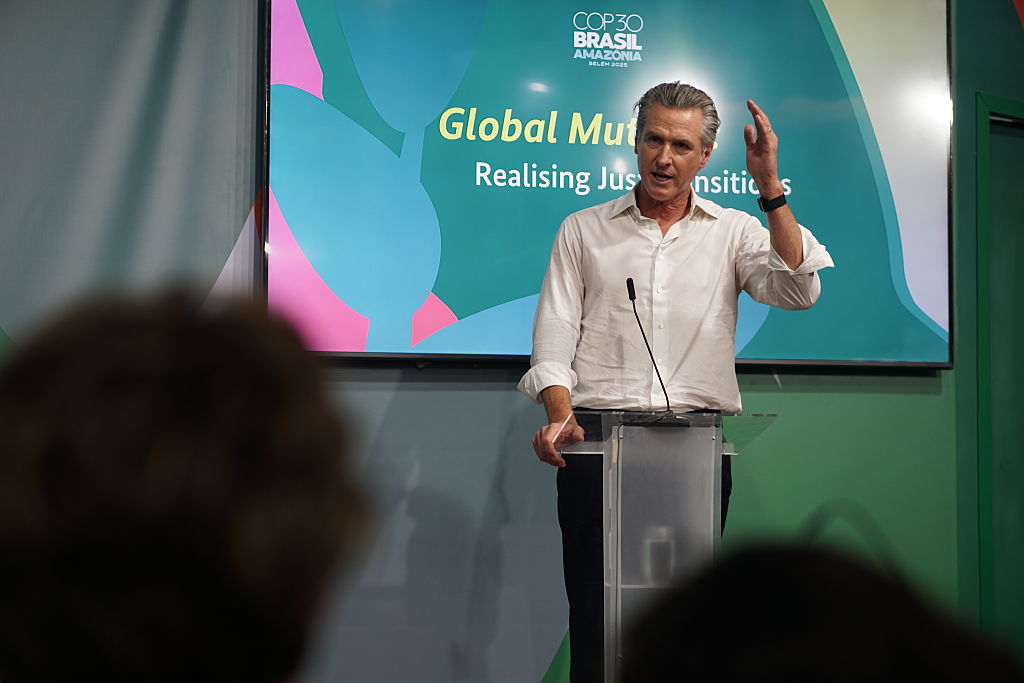During the first days of the U.N. COP30 climate talks underway in the Amazon city of Belém, it felt almost impossible to miss California Governor Gavin Newsom. With the Trump Administration sitting the conference out, Newsom was the best-known American official there, and many attendees seemed to be hanging on his every word. Sitting for a while in the main artery of the conference center, I watched Newsom periodically breeze by, surrounded by a phalanx of security, journalists, and delegate photo-seekers.
[time-brightcove not-tgx=”true”]
Newsom had two main talking points this week. The first was to the international community, to which he emphasized that state and local governments in the U.S. can help make up for the pullback in Washington. And the second, for which he received the most coverage, was his needling of Trump’s climate pullback. “We are doubling down on stupid in the United States of America,” he said at an event in São Paulo held by the Milken Institute.
Newsom, a likely presidential candidate in 2028, portrays himself as a free market advocate and says he is eager to collaborate with the business community. And this was reflected in the events he attended in Brazil. That included the Milken Institute’s Global Investors’ Symposium, widely attended by corporate and financial leaders, along with speaking at a closed-door dinner with business leaders. He talks big about fostering entrepreneurship and streamlining permitting in California to speed up investments. But there is also an unstated warning that companies shouldn’t ignore: the U.S.’s current climate posture may not be around forever. Rules and regulations being struck down today may soon come back. “Regulation drives the certainty,” he said in São Paulo. “What marks the United States right now is uncertainty across the board… it’s madness from an investment perspective.”
Indeed, American businesses banking on a generation of limited climate regulation could be up for a rude awakening come 2028—not too far away for companies who plan investments on long time horizons.
To be clear, the narrative that American businesses have disappeared from the climate discussion is a fallacy. I was surprised by the deep bench of corporate leaders who showed up in Brazil. I spotted high-ranking executives from Google, Mastercard, Microsoft, McDonald’s, and Deloitte—and that was on just one of my flights within the country. Across Brazil, I’ve seen a truly wide range of corporate leaders from ExxonMobil to PepsiCo.
But it’s also true that many companies have adjusted their approach to climate and decarbonization as they try to navigate the new landscape. For some firms, that’s meant cutting investments—think of the American auto industry’s pullback from EVs. In São Paulo, Newsom called out GM specifically as an example of automakers with their “head in the sand.” For other industries, the new landscape has meant trying to placate conservative states and the federal government. Some financial institutions, for example, have loosened restrictions on fossil fuel investment and highlighted their work financing oil and gas.
It is, of course, a silly exercise at this stage to look too closely at the details of what a Newsom climate agenda could look like. During his term, the state has solidified its cap-and-trade regime, crafted new climate disclosure rules, and, in an about face, supported a continuation of nuclear power.
But one thing that is clear about Newsom is his attitude. The two-term governor has modulated climate policy in some cases, but, in general, has refused to yield to threats from the business community about the costs of action. And, as his tack against Trump has shown, he isn’t afraid to be relentless as he takes on opposition.
I’m not in the business of predicting political outcomes, (though both polls and prediction markets suggest that Newsom is the front runner for the Democratic nomination), but what does seem likely no matter who triumphs in 2028 is that future Democratic leaders will probably not look kindly on companies that ditched climate for short-term gain. Trump entered office with an agenda of retribution. While Democrats are unlikely to use the same charged language, it seems unlikely that companies who embraced the Trump climate agenda will be forgotten.
To get this story in your inbox, subscribe to the TIME CO2 Leadership Report newsletter here.
This story is supported by a partnership with Outrider Foundation and Journalism Funding Partners. TIME is solely responsible for the content.

